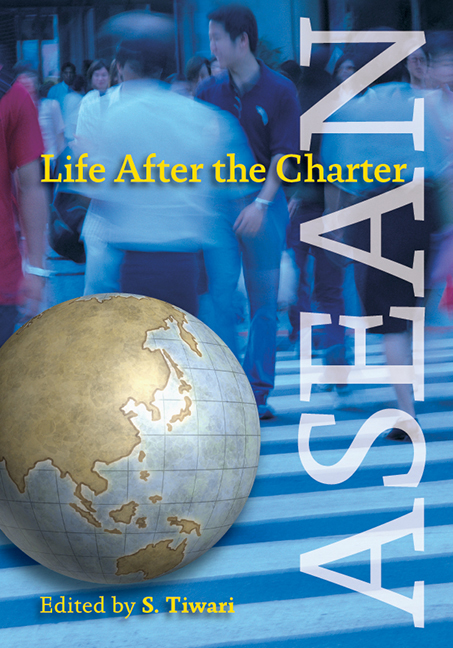Book contents
- Frontmatter
- Contents
- Foreword
- Preface
- List of Contributors
- Introduction
- 1 ASEAN Legal Personality under Its New Charter – Its Nature, Meaning and Implications: Status of the Work and Issues Involved
- 2 Does ASEAN Exist? The Association of Southeast Asian Nations as an International Legal Person
- 3 Life in ASEAN After the Entry into Force of the ASEAN Charter: Implications and Follow-ups
- 4 Translating the Design into a Bloc: The Domestic Implementation of the ASEAN Charter
- 5 ASEAN Trade in Goods Agreement (ATIGA)
- 6 The ASEAN Comprehensive Investment Agreement 2009: Its Objectives, Plans and Progress
- PRIVATE SECTOR PERSPECTIVES
- Index
2 - Does ASEAN Exist? The Association of Southeast Asian Nations as an International Legal Person
Published online by Cambridge University Press: 21 October 2015
- Frontmatter
- Contents
- Foreword
- Preface
- List of Contributors
- Introduction
- 1 ASEAN Legal Personality under Its New Charter – Its Nature, Meaning and Implications: Status of the Work and Issues Involved
- 2 Does ASEAN Exist? The Association of Southeast Asian Nations as an International Legal Person
- 3 Life in ASEAN After the Entry into Force of the ASEAN Charter: Implications and Follow-ups
- 4 Translating the Design into a Bloc: The Domestic Implementation of the ASEAN Charter
- 5 ASEAN Trade in Goods Agreement (ATIGA)
- 6 The ASEAN Comprehensive Investment Agreement 2009: Its Objectives, Plans and Progress
- PRIVATE SECTOR PERSPECTIVES
- Index
Summary
The ASEAN Charter, which entered into force on 15 December 2008, asserts in Article 3 that ASEAN “as an inter-governmental organisation, is hereby conferred legal personality”. This chapter examines the legal status of the Association, as well as the political question of whether the whole is greater than (or perhaps less than) the sum of its parts. The argument presented is that legal personality at the international level is less a status than it is a capacity: the fact that ASEAN now claims international legal personality in the Charter does not mean it lacked it previously, nor that it now possesses it in any meaningful way. Rather, the key question is what specific powers have been granted to ASEAN and how those powers are used. On these questions, the Charter is largely silent.
* * *
In January 1991, less than two weeks before the commencement of hostilities to drive Iraq from occupied Kuwait, the French poststructuralist philosopher Jean Baudrillard published an article in Libération entitled, “The Gulf War Will Not Take Place”. He argued that this war would never happen in a meaningful sense of the word, because technology had transformed perceptions of conflict to the point where all that was left was the simulacrum of war. As the bombs were falling and troops were moving, he produced a follow-up piece: “The Gulf War Is Not Taking Place”. After Iraq had been driven from Kuwait and tens of thousands had died, he returned to the opinion pages with “The Gulf War Did Not Take Place”. The three essays are now conveniently published together in a volume by Polity Press entitled The Gulf War Never Happened.
Is it not a similar conceit to question the existence of ASEAN? Without doubt, the Association of Southeast Asian Nations (ASEAN) represents an important slice of the world. It encompasses a population of around half a billion, with a combined GDP in the order of a trillion U.S. dollars. From the five countries that signed the Bangkok Declaration in 1967, it has added Brunei in 1984, and Vietnam, Laos, Myanmar, and Cambodia between 1995 and 1999.
- Type
- Chapter
- Information
- ASEANLife after the Charter, pp. 18 - 44Publisher: ISEAS–Yusof Ishak InstitutePrint publication year: 2010



